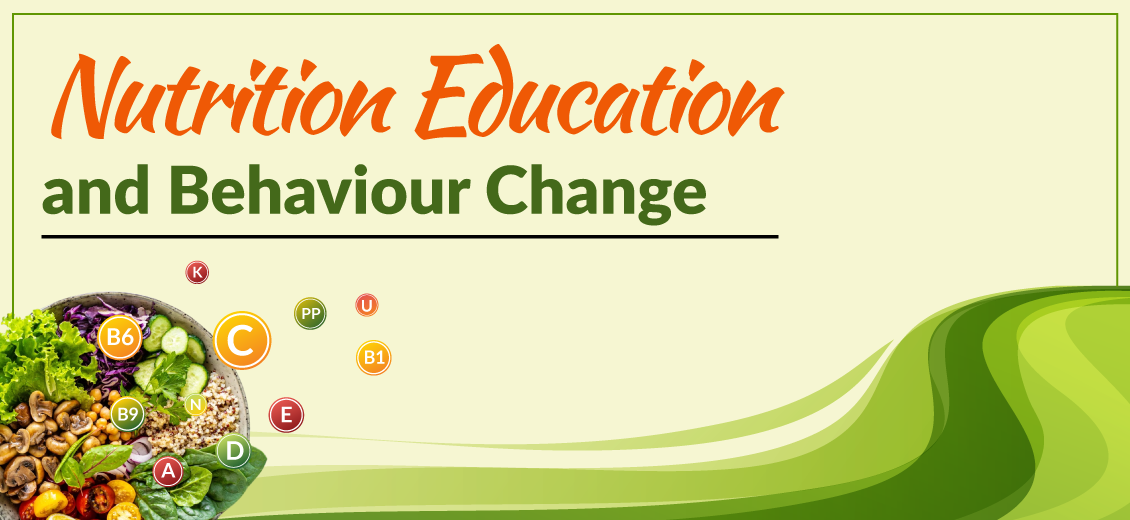Nutrition Education and Behavior Change
Blogs Home
- 08 Sep 2023

National Nutrition Week (1st-7th Sep) is an annual event that serves as a reminder of the critical role nutrition plays in our lives. Proper nutrition is not just about eating; it is about making informed choices that positively impact our health and well-being. One of the most effective ways to promote better nutrition is through education which leads to behaviour change.
Understanding Macronutrients and Micronutrients
Macronutrients, as the name suggests, are the primary fuel sources for our bodies and are required in larger quantities. This category includes fats, proteins, and carbohydrates. On the other hand, micronutrients primarily consist of vitamins and minerals, which are equally vital but are needed in much smaller amounts.
Carbohydrate-rich foods like fruits and vegetables not only provide energy but also deliver a plethora of vitamins, minerals, and fibre. Starchy carbohydrates like brown rice, whole-grain bread, and cereals offer fibre, vitamins and magnesium. Fats are responsible for supplying us with vitamins A, D, E, and K.
It is crucial to recognize that an inadequacy in any of these components can lead to health issues. The key, however, is balance. Excess or deficiency in any nutrient is not conducive to the proper functioning of your body.
Balanced Diet and Food Groups
We can categorise our food into five groups-
1. Fruits and vegetables
2. Grains and carbohydrates
3. Protein sources including pulses
4. Dairy and alternatives
5. Oils or spreads
A well-rounded diet guarantees that the body gets the essential nutrients it needs in proper proportions. Achieving this equilibrium involves incorporating various essential food groups. The amount of food needed to meet individual nutritional requirements differs based on factors like age, gender, physical condition, and activity levels. Ideally, a balanced diet should consist of roughly 50-60% of total calories from carbohydrates, mainly complex ones, approximately 10-15% from proteins, and 20-30% from both visible and hidden fats.
Moreover, a well-rounded diet should also encompass non-nutrients like dietary fibre and antioxidants, along with phytochemicals that offer significant health benefits. Antioxidants such as vitamins C and E, beta-carotene, riboflavin, and selenium play a crucial role in protecting the body from free radical damage. Additionally, phytochemicals found in spices like turmeric, ginger, garlic, cumin, and cloves offer rich sources of antioxidants.
Dietary Guidelines for Healthy Eating
To promote balanced nutrition and healthy dietary habits, here are 15 key guidelines from the National Institute of Nutrition, Hyderabad, that offer valuable insights for everyone:
1. Diversify your food choices for a well-rounded diet.
2. Ensure proper healthcare for pregnant and lactating women.
3. Encourage exclusive breastfeeding for the first six months and continue for up to two years.
4. Introduce homemade semi-solid foods to infants after six months.
5. Provide suitable diets for children and adolescents, tailored to their health needs.
6. Incorporate generous portions of fruits and vegetables into daily meals.
7. Consume edible oils and animal products in moderation, reducing ghee, butter, or vanaspati use.
8. Avoid excessive eating to prevent overweight and obesity.
9. Maintain an ideal body weight through regular physical activity.
10. Limit salt intake to promote heart health.
11. Ensure the consumption of safe and clean foods to prevent foodborne illnesses.
12. Apply proper pre-cooking processes and cooking methods to preserve nutrients and enhance taste.
13. Stay hydrated with sufficient water intake, while consuming beverages in moderation.
14. Minimize the consumption of processed foods high in salt, sugar, and fats for overall well-being.
15. Include foods rich in essential micronutrients in the diets of elderly individuals to support their fitness and vitality.
Nutrition and Non-Communicable Diseases (NCDs) Prevention
Nutrition stands as the cornerstone of a high-quality life. When your body lacks essential nutrients, it can lead to malnutrition, a condition that ultimately paves the way for non-communicable diseases (NCDs).
A recent collaborative study involving the Madras Diabetes Research Foundation, the Indian Council of Medical Research (ICMR), and the Ministry of Health and Family Welfare has underscored the increasing prevalence of NCDs in India. India now hosts a staggering 101 million individuals with diabetes, alongside 136 million with prediabetes. Hypertension affects a staggering 315 million people, while obesity is a pressing concern, with 28.6% of the population classified as generally obese and 351 million suffering from abdominal obesity.
In our pursuit of prosperity, the significance of our health is gradually diminishing. Our increasing reliance on processed foods, driven by the need for convenience, is steering us closer to the realm of non-communicable diseases. To shield ourselves from this impending health crisis, we must return to the fundamentals – freshly prepared, whole foods like fruits, a gift from nature itself.
Impact of Processed Foods and Sugar on Health
Processed foods are foods that have been prepared in advance and are used only after being preserved for a long time. According to experts, anything that comes out of a tin, or a closed box or bottle is called processed food. A few risks mentioned below will tell you how much you need to fear junk and processed foods.
- Eating processed food will make you look older than your age, they contain high sugar, oil, and fats.
- The consumption of artificial sweeteners found in processed foods can exacerbate obesity issues and, at times, even lead to the development of chronic diseases. Processed food products may feature various sugar labels such as glucose, fructose, maltose, etc.
- Your favourite chips and sauce can push you towards heart disease as well. You may be eating them happily at that time but only your tongue likes it, not your body.
- Consumed foods that have undergone processing may significantly contribute to the onset of inflammatory bowel disease, also recognized as Crohn's disease or ulcerative colitis.
- Even If you are eating 50 grams of processed food daily, the risk of colorectal cancer increases by 18%.
Nutrition Education in Schools and Communities
Good and bad eating habits start right from our childhood. Children these days have access to so many unhealthy food items that their immunity system is gradually decaying consuming them and hence they are catching severe problems at a very early age. Therefore, nutrition education in schools and communities is necessary.
Ways for Integrating Nutrition Education in Schools
1. Schools need to add nutrition education into their curriculum to teach children about better food choices.
2. Expert nutritionists should be called to schools from time to time to teach detailed study of nutrition.
3. Extending Engagement Beyond the Classroom: Involving the Entire School, Families, and the Community
4. Cultivating School "Learning" Gardens: Bridging Classroom Education with Hands-On Experience
5. Crafting National Guidelines for Enhanced Dietary Health and Nutrition
6. Cultivating Environments that Encourage Nutritious Choices and Promote Overall Health.
Eating Disorders and Psychological Aspects of Nutrition
Understanding how to eat is as crucial as selecting the right food. Consuming nutritious options hastily, without proper chewing, can resemble gulping, contributing to eating disorders. There are six main types of eating disorders:
1. Anorexia nervosa: Individuals with anorexia see themselves as overweight, even when dangerously underweight. They obsessively monitor their weight, avoid certain foods, and severely restrict calorie intake.
2. Bulimia nervosa: Those with bulimia regularly consume large amounts of food in a short period, followed by purging to compensate for calories and alleviate discomfort.
3. Binge-eating disorder: This prevalent and harmful disorder involves consuming large quantities of food in a short time, often with a sense of loss of control.
4. Pica: This disorder entails eating non-food items with no nutritional value, such as dirt or dangerous substances, driven by an irresistible compulsion.
5. Rumination disorder: People with rumination syndrome repeatedly and involuntarily regurgitate undigested or partially digested food, rechew it, and may either swallow or spit it out.
6. Avoidant Restrictive Food Intake Disorder (ARFID): ARFID is characterised by limited food consumption driven by apprehension and unease related to food, including concerns like choking, resulting in constrained dietary choices.
Behaviour Change Theories and Strategies for Improved Nutrition
Effective behaviour change strategies are crucial for countering lifestyle-related chronic conditions such as cancer, heart disease, and diabetes, which often result from habits like smoking, sedentary living, overeating, and excessive alcohol consumption. Adopting a healthy lifestyle, including regular exercise, a balanced diet, blood pressure control, and smoking cessation, can lead to a longer and healthier life. However, changing ingrained behaviours can be challenging.
An ecological approach to behaviour change recognizes the influence of personal, social, and environmental factors on behaviour. Effective interventions consider all three levels, rather than focusing solely on individual factors. Information provision alone is insufficient to drive behaviour change, as it often neglects the complex influences on behaviour. Instead, theories and models of behaviour change, such as the Transtheoretical Model, Social Cognitive Theory, and Theory of Planned Behaviour, offer insights into understanding and modifying behaviour. Interventions should employ various behaviour change techniques, such as self-monitoring, goal-setting, and personalized messages, to enhance their effectiveness. Additionally, combining motivational interviewing with the self-determination theory has been recommended for a deeper understanding of successful behaviour change strategies. Cognitive Behavioural Therapy (CBT) also plays a vital role in behaviour modification, with evidence suggesting its effectiveness in preventing type 2 diabetes, and hypertension, and managing conditions like childhood and adolescent obesity. These approaches underscore the importance of addressing not only what we eat but also how we can sustain positive dietary changes for long-term health.
As we reflect on the significance of nutrition education and behaviour change, we are reminded that the choices we make today can shape our health and well-being for years to come. National Nutrition Week serves as a beacon, illuminating the path towards a healthier, more nourished future. It is a call to action, urging us to embrace the wisdom of balanced diets, the importance of understanding our nutritional needs, and the critical role of education in fostering lifelong healthy habits. With the looming spectre of non-communicable diseases and the allure of processed foods, the need for change is more urgent than ever. Let us heed this call, not just during this dedicated week but every day, by making informed choices, cultivating healthier lifestyles and championing the transformative power of nutrition education. Together, we can create a healthier, happier world, one nutritious choice at a time.
Sources:
- https://www.nin.res.in/downloads/DietaryGuidelinesforNINwebsite.pdf
- https://www.healthline.com/nutrition/common-eating-disorders
- https://www.fao.org/nutrition/education/en/
- https://www.drishtiias.com/daily-updates/daily-news-analysis/alarming-rise-of-non-communicable-diseases-in-india
- https://www.who.int/news-room/questions-and-answers/item/cancer-carcinogenicity-of-the-consumption-of-red-meat-and-processed-meat#:~:text=An%20analysis%20of%20data%20from,cancer%20is%20not%20as%20strong.
- https://indianexpress.com/article/explained/explained-health/diabetes-obesity-hypertension-8670730/
- https://www.eufic.org/en/healthy-living/article/motivating-behaviour-change
Priyanka Todariya

Priyanka Todariya is a Public Administration post-graduate and an experienced communications professional who has extensively worked for several government entities like Ministry of Jal Shakti, Ministry of Skill Development and Entrepreneurship, National Skill Development Corporation (NSDC) and state governments like Uttar Pradesh and Gujarat.
Blogs Home



